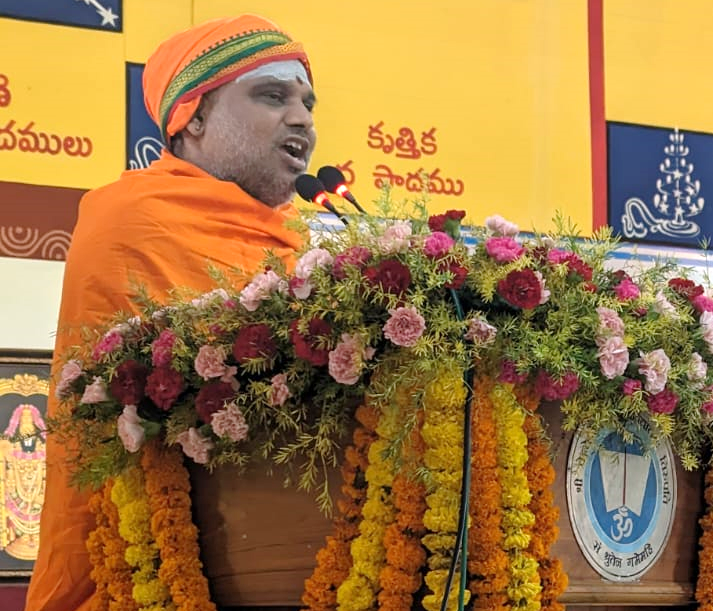
Welcome to read the Articles by
Dr Vamshi Krishna Ghanapaathi
• Academic, Author, Administrator • Scholar of 4 Vedas, Shaastra
•Speaker in English, Sanskrit, Telugu, Kannada, Hindi
<Home> <Live Page>
Articles
Poetry
Videos
Admin Works
Trans-Genders in Vedic Scriptures
We have the trends from Western Part of the planet, about the Trans-Gender fantasies and efforts. Is this a new phenomenon or an old pattern?
Certain traits are attached to each of the personality. Historically and Culturally, the word masculinity indicates bravado, valour and vigour. Conversely, Tenderness, Care and Affection are connoted with the adjective Feminine.
Rarely, people born with certain traits might consider their body in a particular gender, not suitable to their traits (Mano_Bhaava). Therefore, the internecine stuggle to live a different life in the guise/ body of other gender might emerge. Even among them, many could adjust with hormonal activity in adolescence and later stages. But, the rarest people, who could not get on with that, opted for different attempts to change the gender. Few such cases to name:
- Shikhandi is a character in the Mahabharata who is neither man nor woman, and is the reincarnation of Ambaa, a princess who was abducted by Bhishma at a Svayamvara and later spurned by him. Shikhandi is the eldest child of King Drupad, and the father of Draupadi. (Draupadi is also the second wife of the Pandava Madhyama Arjuna.) To carry out the vengeance leading to the killing of Bhishma, Amba has exchanged her gender with someone called Sthuna_Karna. He stood in the battle against Bhishma, who was bound by his own vow not to fight against a woman due to his principles of a warrior (Kshatriya Dharma). At this juncture, Arjuna was prodded by others in the army, to vanquish Bhishma, which was tacitly approved by Bhishma himself, to atone his mistake of Rajadharma siding with Kauravas.
- Naarada was taunting the indulgent behavior of Gruhasthas (family people). Instead of aspiring for Vishnu Bhakti, they always think about their family and the problems there of. Lord Vishnu, wanted Narada to experience the life of a family lady, who has many responsibilities to foster and nurture a family. By taking a dip in a Pond, Narada was transformed as a Lady and had indulged in the love, lust, family, sorrows and extreme sense of being lost and deprived. Thus, he experienced the sense of Hari Maaya/ Vishnu Maaya.
- Less known is the verse from Rigveda, where an instance is narrated in the Mantra. This is about the mental state of a woman. Remember that, we have to appreciate the tenderness and affectionate of a mind, rather viewing the meaning from a stand-alone misogynist perspective.
- इन्द्र.श्चिद्घा तदब्रवीत्- स्त्रियाˆ अशास्यं मनः। उतो अह क्रतुं रघुम्।।
- The context is the story of a Rajarshi called Aasanga, who is the son of Playoga. (Therefore he was called as Aasangah Plaayogih – आसंगः प्लायोगिः)। He was a rich king as well as a Rajarshi (King in the mindset of an ascetic). Shashwati was his wife and daughter of Sage Aangirasa.
- This story of Aasanga was mentioned by Saayana Aacharya (Commentor) on RV. (6.3.10). Once, Aasanga the was engaged in Vedic sacrifice, not out of ritualistic fervor, but from a dispassionate liberality. Consequently, on one occasion, he made the mistake of using improperly cut wood (Samidhaa) .. the withered sticks fallen from trees which were partially consumed by pests.
- For this mistake, he was transformed as a maid-servant. Later, Rishi Playoga beseeched the Lord Indra to end the prohibition on the use of windfall wood, or such or such sticks as partially consumed by insects, so that in future, no innocent should suffer Aasanga's fate.
- By the great recitation of Rishi Medhyaatithi in the Praayaschitta Yajna (Atoning sacrifice), Aasanga was restored to manhood as well as the power of penance. The invigorated King, was indeed pleased by this great favour by the powerful Rishi, and consequently bestowed much wealth on the seer (30-33) which was also praised by his wife.
- Words of Indra: It is fallacy to deem that a Man could Control the Mind of a Woman. This implies that basically, a woman might appear physically weak, but mentally she is stronger and can’t be controlled by others. Due to the quotient of stronger emotions, she might be impulsive and less striving to reach the goal, due to other immediate family priorities. However, once determined she could reach the goal, in spite of all adversities. This is the purport of the Mantra. Shubham ….